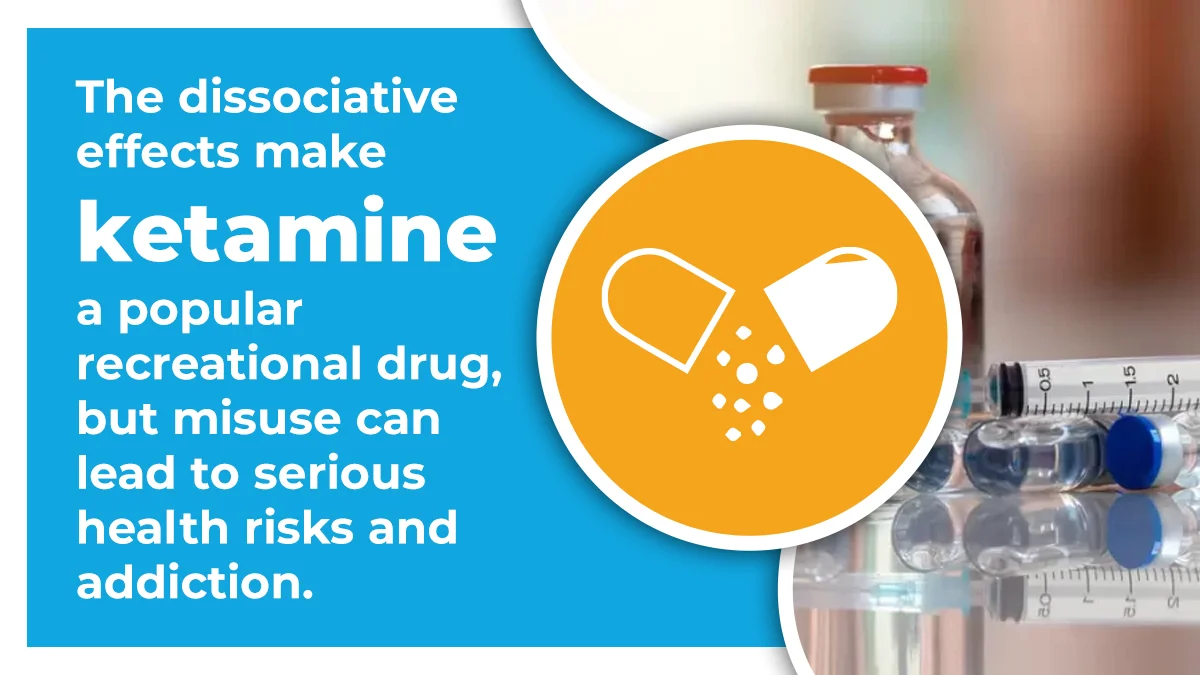Ketamine Abuse: Causes, Impact and Treatment
Ketamine, originally developed as an anesthetic, has gained notoriety for its potential for abuse and recreational use. This dissociative anesthetic has seen an increase in abuse cases.
Ketamine abuse poses serious health risks, ranging from hallucinations and impaired cognition to more severe consequences, such as addiction and organ damage.
Understanding the dynamics of ketamine abuse is crucial for implementing effective preventive measures and treatment strategies to address this emerging issue.
Treatment Services
Ketamine abuse can have serious consequences on an individual’s physical and mental health. Fortunately, there are various treatment services available to help those struggling with ketamine addiction.
Treatment may involve a combination of medical, psychological, and behavioral interventions to address the specific needs of the individual. It’s important to seek professional help to guide the recovery process and provide the necessary support.
Key Takeaways
Effective prevention and intervention strategies are crucial to address the growing concern of ketamine abuse and its impact on public health. Here’s what you need to know:
- Ketamine is an anesthetic medication with rapid-acting antidepressant properties, showing promise in treating severe depression.
- Its dissociative effects make ketamine a popular recreational drug, but misuse can lead to serious health risks and addiction.
- The use of ketamine requires careful consideration due to potential side effects and concerns about abuse and long-term safety.
Contact The Recovery Team at (800) 817-1247 for more information and personalized recovery assistance.
Symptoms of Ketamine Abuse
Ketamine abuse can lead to various physical, psychological, and behavioral symptoms. It’s important to note that these symptoms may vary among individuals, and the severity of symptoms can depend on factors such as the amount of ketamine used, frequency of use, and individual susceptibility.
Here are some common symptoms of ketamine abuse:
Physical Symptoms
- Slurred speech
- Impaired motor coordination
- Nausea and vomiting
- Increased heart rate and blood pressure
- Muscle rigidity or weakness
- Distorted perception of time and space
- Dizziness or fainting
Psychological Symptoms
- Hallucinations
- Disorientation
- Delirium
- Altered sensory perceptions
- Feelings of detachment from reality
- Anxiety or panic attacks
- Impaired memory and concentration
Behavioral Changes
- Risk-taking behavior
- Impulsive actions
- Social withdrawal
- Changes in sleep patterns
- Neglect of responsibilities at work, school, or home
When to Seek Treatment
Knowing when to seek treatment is essential for individuals struggling with ketamine abuse. If there’s a loss of control, negative impacts on life, physical or mental health issues, withdrawal symptoms, or concerns raised by others, professional help is warranted.
Seeking treatment becomes particularly crucial when the individual faces challenges in controlling or stopping ketamine use despite negative consequences and a desire to quit.
If a Loved one Needs help
Approaching a loved one about their ketamine abuse requires expressing concern in a supportive manner. Encourage them to seek professional help from medical professionals, therapists, or addiction specialists who can assess and provide appropriate treatment.
Offering emotional support throughout the recovery process is essential, as is avoiding enabling behaviors. Refrain from providing financial support for drugs and steer clear of situations that may trigger substance use.
In more severe cases, a formal intervention with the assistance of a professional interventionist may be considered to motivate the individual to seek treatment.
Causes of Ketamine Abuse
Ketamine is a dissociative anesthetic that is used medically for various purposes, including anesthesia, pain management, and treatment-resistant depression. However, like many drugs, it has the potential for abuse.
Here are some causes and risk factors associated with ketamine abuse:
- Recreational Use: Ketamine is sometimes used recreationally for its hallucinogenic and dissociative effects. Individuals may seek the euphoria, altered perceptions, and out-of-body experiences associated with ketamine use.
- Peer Pressure: Social influences can play a significant role in drug abuse. Individuals may be encouraged to try ketamine in social settings, such as parties or gatherings, where the drug is available.
- Escapism: Some individuals may use ketamine as a means of escaping from reality or coping with stress, emotional pain, or psychological issues. The dissociative effects of the drug can create a sense of detachment from one’s surroundings.
- Curiosity: Some people may experiment with ketamine out of curiosity, wanting to experience the unique effects of the drug.
- Self-Medication: Individuals may misuse ketamine as a form of self-medication to cope with mental health issues such as depression, anxiety, or post-traumatic stress disorder (PTSD).
- Lack of Awareness: Limited knowledge about the potential risks and consequences of ketamine abuse may contribute to its misuse.
Risk Factors of Ketamine Abuse
The misuse of ketamine can lead to various physical, psychological, and social consequences.
Here are some risk factors associated with ketamine abuse:
- History of Substance Abuse: Individuals with a history of substance abuse are at a higher risk of abusing ketamine or other drugs.
- Mental Health Issues: People with pre-existing mental health problems, such as depression or anxiety, may be more prone to using club drugs as a way to cope with their symptoms.
- Environmental Factors: Living in an environment where drug use is prevalent or where there is easy access to ketamine may increase the risk of abuse.
- Peer Influence: Being in social circles where ketamine use is accepted or encouraged can contribute to an individual’s likelihood of abusing the drug.
- Age and Gender: Young adults and males have a higher risk of ketamine abuse.
- Accessibility: Easy access to ketamine, whether through medical sources or illicit means, can increase the likelihood of abuse.
- Impulsivity: Individuals with impulsive tendencies may be more prone to experimenting with substances like ketamine without fully considering the potential consequences.
It’s important to note that these causes and risk factors can vary among individuals, and a combination of factors may contribute to ketamine abuse. Seeking professional help is crucial for those struggling with substance abuse issues.
Effects of Ketamine Abuse
Ketamine is a dissociative anesthetic that is commonly used in medical settings for anesthesia and pain management. However, when abused, ketamine can have various negative effects on both physical and mental health.
Here are some potential effects of ketamine abuse:
Physical Health Effects
- Bladder Problems: Long-term abuse of hallucinogenic drugs has been associated with damage to the bladder, leading to a condition known as ketamine-induced cystitis. Symptoms may include pain during urination, increased frequency of urination, and blood in the urine.
- Kidney Damage: Chronic ketamine abuse may contribute to kidney dysfunction and damage.
- Cardiovascular Issues: Ketamine abuse can lead to increased blood pressure and heart rate, which may pose risks for people with cardiovascular conditions.
Psychological Effects
- Hallucinations and Disorientation: Ketamine veterinary medicine is known for its hallucinogenic properties, and abuse can lead to intense and unpredictable hallucinations. People may experience a dissociation from reality.
- Memory Impairment: Ketamine abuse can affect memory and cognitive function, leading to difficulties with concentration and learning.
- Depression and Anxiety: According to studies, prolonged ketamine use may contribute to mood disorders, including depression and anxiety.
- Psychosis: In some cases, ketamine abuse has been associated with psychotic symptoms such as delusions and paranoia.
Addiction and Tolerance
- Potential for Dependence: Ketamine has the potential for psychological dependence, and users may develop a tolerance over time, requiring increasing amounts to achieve the desired effects.
- Withdrawal Symptoms: Individuals who are dependent on street ketamine may experience withdrawal symptoms when they try to quit or cut back on use. These symptoms may include cravings, insomnia, anxiety, and mood swings.
Risk of Accidents and Injuries
- Impaired Coordination: Pharmaceutical ketamine can impair motor skills and coordination, increasing the risk of accidents and injuries.
- Loss of Sensation: The anesthetic properties of ketamine may lead to a loss of sensation, making users more susceptible to accidental injuries.
Social and Occupational Implications
- Strained Relationships: Ketamine abuse can strain relationships with family, friends, and colleagues, as individuals may prioritize drug use over personal and professional responsibilities.
- Occupational Issues: Ketamine abuse can lead to poor job performance, absenteeism, and the risk of job loss.
It’s important to note that the severity and specific effects of ketamine abuse can vary among individuals. Seeking professional help and treatment is crucial for those struggling with substance abuse issues. If you or someone you know is facing substance abuse problems, reaching out to healthcare professionals or addiction treatment centers is recommended.
Treatment for Ketamine Abuse
The treatment of ketamine abuse typically involves a comprehensive approach that treats both the physical and psychological aspects of addiction.
Here are some treatment options for ketamine abuse:
Medical Detoxification
The first step in treating ketamine overdose is often medical detox. This process helps individuals safely and comfortably withdraw from ketamine under medical supervision. Since ketamine withdrawal symptoms can include anxiety, cravings, and insomnia, medical professionals may administer medications to manage these symptoms.
Inpatient Rehab
Following detox, individuals may enter an inpatient treatment program. In this setting, patients live in a controlled environment where they receive 24/7 medical and therapeutic support. Inpatient rehab programs offer a structured and intensive approach to address the underlying issues contributing to ketamine abuse.
Behavioral Therapies
Behavioral therapies are a crucial component of ketamine addiction treatment. Cognitive-behavioral therapy (CBT) and contingency management are often employed to help individuals identify and change negative thought behaviors associated with drug use.
These therapies also help individuals develop coping strategies to prevent relapse.
Aftercare Planning
A comprehensive treatment plan should include aftercare planning to support individuals transitioning back to daily life. This may involve outpatient therapy, support groups, and ongoing monitoring to prevent substance use disorders.
Rise Above Ketamine Addiction with The Recovery Team
Take control of your life and overcome ketamine abuse with the dedicated support of The Recovery Team.
Our comprehensive addiction treatment services encompass residential, intensive outpatient, and transitional living programs, ensuring a tailored approach to your recovery.
In addition, our Cognitive Behavioral Therapy approach empowers individuals to identify destructive behaviors and develop coping strategies, fostering sustainable recovery.
Unleash your potential and rewrite your story with us. Call us at (800) 817-1247 today.






